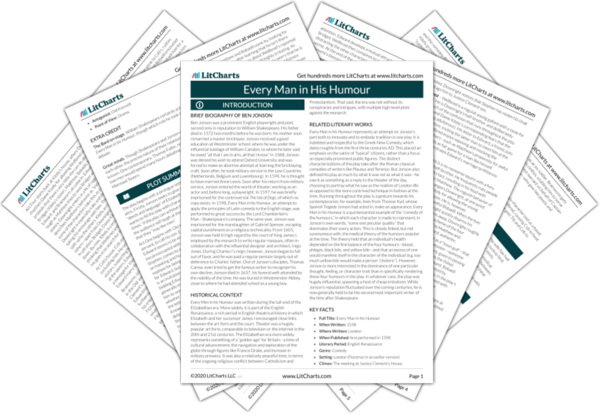In Elizabethan London, it was not uncommon for men to carry swords or daggers; accordingly, there’s quite a few mentions of them in Every Man in his Humour. When Master Matthew calls on Captain Bobadil, a braggart soldier, early on in the play, Bobadil doesn’t waste any time in (falsely) bragging about his exploits in wars and duels. He shows Matthew some swordfighting techniques, demonstrating his machismo and bravado in the process to his impressed companion. On the hand, then, swords represent exactly that: male aggression and status. This is played on throughout. In one instance, country simpleton Stephen buys a cheap knock-off sword from Brainworm (who is disguised as an ex-soldier), thinking it will enhance his prowess. He soon learns that it isn’t, in fact, a genuine Spanish Toledo. Later in the play, Downright challenges Bobadil and quickly disarms him; this represents a kind of emasculation, with Downright depriving his opponent of the (phallic) symbol of his male vigor. More generally, the abundance of swords in the play speaks to the tense, powder-keg atmosphere—the audience senses that a fight could happen at almost any time, if someone says or does the wrong thing.
Swords Quotes in Every Man in His Humour
Act 5, Scene 2 Quotes
JUSTICE CLEMENT: Nay, keep out, sir; I know not your pretence. You send me word, sir, you are a soldier: why, sir, you shall be answered, here, here be them that have been amongst soldiers. Sir, your pleasure.
BOBADIL: Faith, sir, so it is, this gentleman, and myself, have been most uncivilly wronged, and beaten, by one Downright, a coarse fellow, about the town, here, and for mine own part, I protest, being a man in no sort given to this filthy humour of quarrelling, he hath assaulted me in the way of my peace; despoiled me of mine honour; disarmed me of my weapons; and rudely, laid me along, in the open streets: when I not so much as once offered to resist him.
JUSTICE CLEMENT: Oh God's precious! Is this the soldier? Here, take my armour off quickly, ‘twill make him swoon, I fear; he is not fit to look on't, that will put up a blow.
Act 5, Scene 3 Quotes
JUSTICE CLEMENT: Why, Master Downright, are you such a novice, to be served, and never see the warrant?
DOWNRIGHT: Sir. He did not serve it on me.
JUSTICE CLEMENT: No? how then?
DOWNRIGHT: Marry, sir, he came to me, and said, he must serve it, and he would use me kindly, and so—
JUSTICE CLEMENT: Oh, God's pity, was it so, sir? He must serve it? Give me my longsword there, and help me off; so. Come on, sir varlet, I must cut off your legs, sirrah; nay, stand up, I'll use you kindly, I must cut off your legs, I say.












